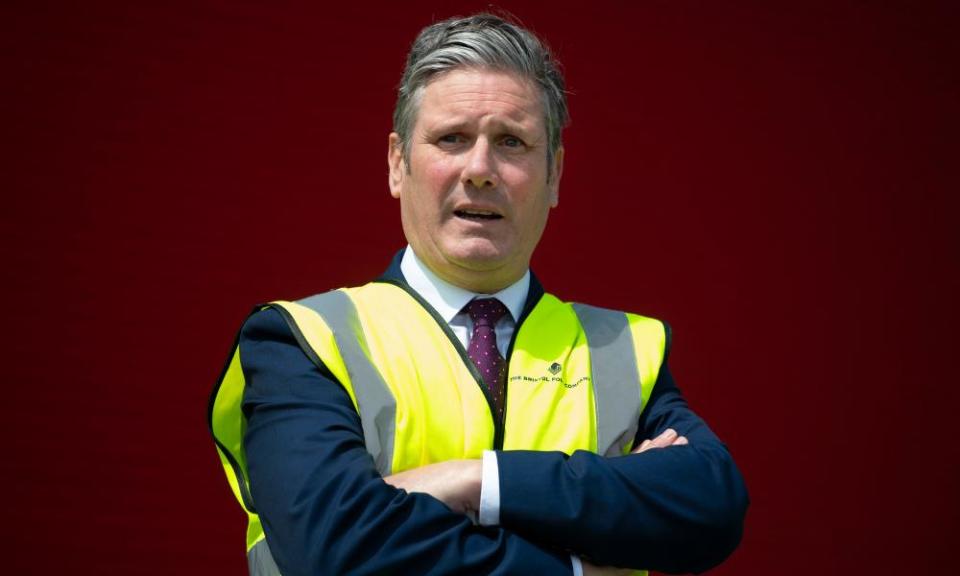With the extension of lockdown, Labour has one more chance to get match-ready

On the rights and wrongs of extending the lockdown in England, I plead the Alan Sugar case – for anyone who missed it, which is surely almost everyone, the opinions magnate said “I’m no doctor, I’m no scientist, the thing is changing every day and I have no idea.” It’s surely the wisest thing he has ever said.
What is clear, though, is that the continuing lockdown has a powerful effect on politics. In news terms, it is obliterative; nothing else matters while coronavirus is on manoeuvres, so it misshapes the agenda the way Brexit did. Unlike that manmade crisis, however, wherein the facts never really changed, they just became more monotonous as increasingly unqualified people tried to bend their reality, the story of Covid changes constantly. You can’t make a political plan around a mutating virus. All you can make is a public health plan.
Related: Keir Starmer accuses Boris Johnson of failure of leadership in anti-racism row
Furthermore, the great tragedy of lost life has fostered a sense that we should all be pulling together. To squabble about ideas is disrespectful to those who are bereaved, and nobody, at least according to the focus groups, wants to see the virus “politicised”. It was an error to accept that in my view: there is a world of difference between petty point-scoring and making a coherent demand for accountability, but it’s too late now to relitigate.
Finally, there have been the practical constraints: Keir Starmer would probably never have appeared at Glastonbury to hear 20,000 people sing his name, but he does feel keenly the absence of the walkabout, being able to meet voters, so that he would become flesh-and-blood to them, and they would deliver to him the sense of purpose that has instead come off as rather abstract.
Lockdowns represent a political hiatus as much as a social one. The opposition has now been given another extension on its project, which is to explain who it is and why it exists. The government’s programme, coming out of the pandemic, is guessable. Johnson has already started to sketch out his desire for a more “gender-neutral, feminine” world which, coupled with his “levelling up” agenda, amounts to a classic Tory-moderniser promise: we’re going to be just like a Labour government, only better at it. Labour generally, and Starmer in particular, need to find a relaxed, plausible register in which to describe this as the fantasy it is.
They don’t need to get into the weeds of what a “feminine” world actually looks like, never mind how to achieve gender neutrality and femininity at the same time, but to say quite plainly: this isn’t going to happen. The Conservatives are never going to level up, not because they lack the competence to enact effective redistribution, nor because they will always prioritise the demands of capital, even though both those things are true, but because they do not intend to. Their electoral strategy is that of an end-of-the-pier magician – distraction, sleight of hand, big splashes of colour and showmanship. Labour needs to stop critiquing the government on a trick-by-trick basis and find a way to say “this whole thing is an illusion”.
Across an increasingly fractured Labour party, there is one point of agreement: that the leader has to find a way to say who he is, to become three-dimensional to, and definable by, the electorate. In this enterprise, it may have been necessary for Starmer to express his feelings about his family to Piers Morgan – my jury’s out – but it is not sufficient. He won’t coalesce as a politician until he says something that costs him: something a Conservative couldn’t say, something that will win him enemies as well as friends.
He will never be able to mimic the buffoonery of his opponent, but he shouldn’t just accept the other side of the binary – the mirthless technocrat – as his lot. The best single answer to the conundrum of conveying both authenticity and humour would be to come clean: to walk, undefended, straight into the territory he’s been avoiding. He seems to fear the shadow of his Mr Remain reputation in a post-Brexit landscape, along with his human rights hinterland in a morally debased discourse. But everybody knows that’s who he is. This would be a powerful moment to admit it.
The pandemic has masked some important political realignments. Nationally, there is increasing revulsion against the realities of life after a decade of Conservatism – the racism, the aggressive ethno-nationalism, the child food poverty, which is really just a modern way of saying “hardship”. This is currently finding all its expression through football, whether that’s players taking the knee, Gareth Southgate’s powerful argument for progressive patriotism or Marcus Rashford’s school meals campaigning. Meanwhile, internationally, Joe Biden’s unexpected courage and clarity – on climate change, super wealth, tax avoidance, vaccine hoarding – is invigorating progressives in the US and beyond. A radical programme from the Labour party would be nothing like as novel and discombobulating in this context as it was in 2015.
There’s a view that if Labour loses the byelection next month in Batley and Spen, the party will be drained of whatever mojo it had left. In a curious echo of footballers taking on the work of politicians, political analysis has adopted the rubric of football: Labour has got to win this match or else its manager will be sacked. But for whoever is leading the party, the challenge remains: when politics resumes, they need to be ready.
Zoe Williams is a Guardian columnist

 Yahoo Finance
Yahoo Finance 